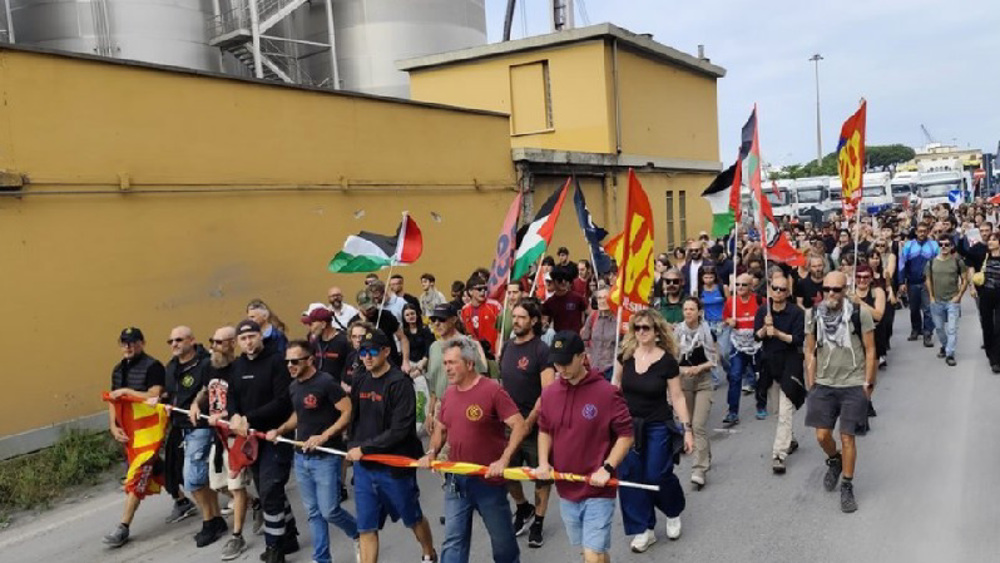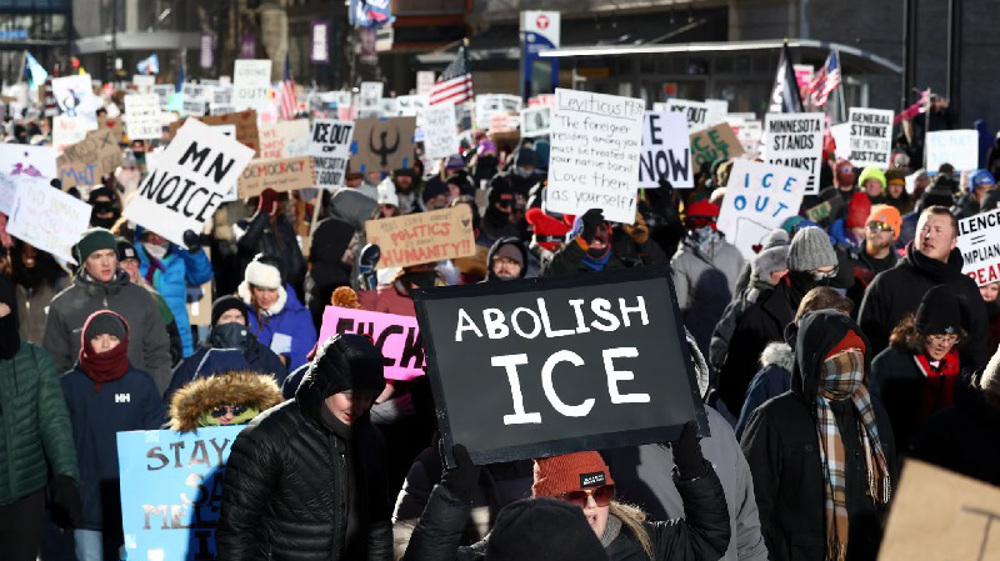Venezuelan Foreign minister: West wants Latin American resources
Bolivia and Venezuela have recently enjoyed significant socialist victories in their presidential and legislative elections, respectively. Two countries that the United States and its allies have continued to undermine and target for regime change.To see how this was achieved, Richard Medhurst, Author and Journalist, has performed an interview with the Venezuelan Minister of Foreign Affairs, Jorge Arreaza, exclusively for Press TV, as part of his regular show, ‘Communiqué”.
Richard Medhurst: Joining me from Caracas is the Venezuelan Minister of Foreign Affairs, Jorge Arreaza. Thank you for coming on the show, Your Excellency; it's a pleasure to have you.
Jorge Arreaza: Hi, Richard My pleasure, my honour to be here.
Richard Medhurst: We're hearing from Western countries especially that, you know, the election was somehow legitimate and they were actually saying this before it even took place. What is your response to those criticisms?
Jorge Arreaza: Oh, we're used to it you know they are having this kind of complaints, even in advance since 2017. They decided that the opposition in Venezuela, the BOGOSIOR opposition should rule, to take power in Venezuela, because maybe they, they are alike to the European elite and to the elite in the United States so they have tried, by all means to make this happen they have tried to not recognise the elections to impose a fake government to be behind the coup attempts to kill the president, so it's it's maybe a natural reaction because we are building a new way of organising our society. We have a lot of natural resources, oil, gas and minerals, and they decided that there cannot be a socialist revolution in Venezuela, but our people decided that there will be a socialist revolution in Venezuela, and we keep on winning political spaces, and last Sunday's election was a very good election was an heroic victory for the Venezuelans whom in spite of the sanctions or the lack of a fuel so many obstacles, went to the ballots and they elected the new National Assembly.
Richard Medhurst: How do you respond to the critics who say that even though your party got the majority of the votes the overwhelming majority 68%, that the voter turnout was low was around 31%?
Jorge Arreaza: We're in the middle of a pandemic, there is lack of fuel in Venezuela, we have been under aggression, the opposition boycotted the election. The US government says that you cannot vote in an illegitimate election. And, of course, it's election for the members of parliament, it's not the same as presidential elections, each election in Venezuela is different. And, for instance, in 2005 for the election for the National Assembly the turnout was 25%. And there was no aggression, there was [plenty of] gasoline, there were no obstacles and Washington was not interfering. So that's why I say this has been heroic because, in spite of all these circumstances the Venezuelan people has regained have regained the National Assembly, new deputies have been elected, and we are going to have a legislative power back in Venezuela.
Richard Medhurst: What do you expect to see from the opposition next because the entire premise of Guido's supposed legitimacy was that he was the head of the National Assembly. He's not the head anymore so where are they going to draw this legitimacy from now, because the UK and the US have said that they will continue to regard him as the president of Venezuela?
Jorge Arreaza: Today I read a statement or an interview, I believe, from Enrique Caprice, who used to be one of the most important politicians in the opposition, and he states that there is no leadership in the opposition, there is no leader, and he is right, they are fractured. they are divided, they, they did things wrong, they submitted themselves to Washington, so now they have no future, the way that they have been behaving, so I don't really know what can happen, but that's their own issues, their own their own theme, so let them discuss and let's see if they can get united or if they finally divide absolutely that's none of our business. But what is going to happen is that next January the fifth, we will have a new National Assembly in Venezuela, and I am surprised that you can still that you remember the name of this deputy of Mr Guido because most media they had a lot of trouble to learn how to write his name. And now they have left, they have forgotten how to write it. That's the reality.
Medhurst: Yeah, it's, it's quite funny how they're promoting someone that Venezuelans don't even know I mean, it's absurd. I wanted to ask you about Iván Duque Márquez the Colombian president, he actually blocked a plane from leaving over Colombian airspace from Venezuela back to Mexico, a plane full of international observers, you know they complain about lack of legitimacy and transparency when they're also blocking international observers and what do you make of that?
Jorge Arreaza: If it were not so delicate and grave, we could say their childish behaviour, but we're used to it in Venezuela, the thing is that just today more than 200 of the over 300 observers that came for the elections had to suffer this this small expression of the blockade against Venezuela. So, in spite of the fact that the national authorities of Venezuela had the over-flight permission, a week ago, when the plane was about to take off they decided that they cancelled this authorization. So, it's now in Colombia the mercenaries have been trained, and with the support of the government, to attack Venezuela. Mercenaries from Venezuela, with, you know, this defected militaries and mercenaries from the United States, former Green Berets that trained in Colombia, they tried to come to Venezuela and to kill the president, to kill other political leaders. There are still many mercenaries in Colombia beeing trained to attack Venezuela.
They have tried to block us, that you have to understand that this, This fellow Duquesne is not the president of Colombia, he's just a man that works for the elite in the United States. Now I like Donald Trump was the president of a big corporation and the CEO. And this was one of the main executives and him and also natto, and others on mackley. At some time, at some point, they can be promoted if they attack if they try to isolate if they try to kill the Venezuelan project. So we are used to it but we have, we have learned to have strategic patience. The people are Argentina, Mexico, and I am sure of Chile, Ecuador, Colombia, Brazil will change these governments and everything will come where it should be.
Medhurst: What do you expect to see from the incoming Biden administration? How do you think the relationship is going to be between Venezuela and the United States in January?
Jorge Arreaza: Well, you know, we've been 22 years in power. And we've learned that the imperialist government of the United States, the system of the United States is one, despite who is ruling and which party is in the White House. So we don't have very high expectations. There are some differences. Maybe it's formal, but the thing is, if the United States elite wants to rectify, or wants to have better relations with Venezuela, we are open. We even tried to have dialogue with Mr. Trump. It happened to some extent, but not, as we expected. We shall see if there is a better opportunity with Biden, but it's not something that changes the Venezuelan history. If they want, we want, if they don't want, we will prevail.
Medhurst: Do you expect to see any kind of detente at all? Or do you think it's going to be a continuation of this imperialist aggression on Iran on Venezuela and attempting to take over the oil the energy sector and curb Venezuela's military?
Jorge Arreaza: Imperialism has its goals, its objectives, and they are always there, some government come, try to change tactics, but this strategic path is already designed. It was designed 200 years ago, and we don't expect different behaviour from the United States. But if we are surprised, and they change, because they feel the pressure of their own people, or these demonstrations, and they need to give some signals in the world, we will receive the any move, how it should be, but if they behave like they have, until now, it's in our plan. So we will continue going forward in spite of the fact of who is in the works.
Medhurst: So we've seen a real friendship and Alliance developing between Iran and Venezuela, Iran recently sent another shipment of fuel tankers to Venezuela. What kind of further cooperation can we expect to see between the two countries?
Jorge Arreaza: We've had a great relationship with Iran since 2003. And it's, it's been getting even more closer and more integral, because we are advancing in new sectors that we hadn't before. And that we should find Mr. Trump for this last steps that we have taken because we've come even more together because of the aggression against Iran and against Venezuela at the same time. So this is a relationship that is going to grow, it's going to expand, and we are very honoured of having this kind of relation with you.
Medhurst: What do you see in regards to the economic situation? COVID-19 these brutal sanctions, that maximum pressure campaign, because, you know, we're seeing it in Venezuela, we're seeing in my country, in Syria, we're seeing this in Iran, and it's really hurting the civilian population. So I mean, where do we go from here?
Jorge Arreaza: Yes, I believe that this is a time when the world is transforming. We are building a multipolar world. And this is a fact mainly the entire imperialism is not only the United States government and the league, it's also elites in Europe, you have suffered of this. And other places. It's it's this group of corporations taking decisions for the governments. And we are sure that this is this is going to change and the multipolar world is, is being born. And it's a matter of us now, being attacked, or being marginalised, getting together we are the real world, the world isn't the South is the countries that want to be free, the people that want to be free. So it's a matter of coordination. And after having the capacity of planning together or executing plans together, that we can make this world more peaceful, more secure, and stop imperialism, imperialism is is going to disappear this century. But we have to be intelligent, and we have to be united in these strategies to confront the last year of this monster that is dying.
Medhurst: Your Excellency, I'm really grateful for your time and for coming on the show. It's truly an honour and a privilege to host you. Thank you so much.
These socialist victories, in Venezuela, in Bolivia, should not be underestimated. These show that resistance is possible, they show that anti imperialism is possible, they show the power of alliances, and what can be done in the face of adversity. The people of Venezuela, the people of Bolivia have shown that they will not be subdued or subjugated they will not submit themselves to the will of the United States and its allies and multinational corporations that seek to steal their land and their resources and their wealth in plain sight.
VIDEO | Press TV's news headlines
Thousands rally in Australia against Israeli president's visit as police use pepper spray
Child among four killed as Israel attacks southern Lebanon in ceasefire breach
Russia vows ‘all possible assistance’ to Cuba as US squeezes oil supplies
Hezbollah leader: Israel‑US aggression is Lebanon’s main challenge
Muslim nations condemn Israel’s new West Bank settlement laws
Iraq executes ex-Saddam official over 1980 killing of Shia cleric Baqir al-Sadr
Iran could dilute 60% enriched uranium if ‘all sanctions lifted’: Nuclear chief










 This makes it easy to access the Press TV website
This makes it easy to access the Press TV website